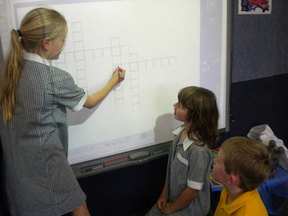Curriculum

St. Joseph’s provides a curriculum which covers the essential aspects of children’s cognitive, cultural and spiritual development. The curriculum is challenging, innovative and dynamic, presented by passionate, dedicated, creative teachers.
The following subject areas are taught:
Inquiry Units
At. St. Joseph’s we use the Integrated approach with the above areas being allocated a term each on a 3 year cycle. We aim to:-
NAPLAN- The National Assessment Program for Literacy and Numeracy (NAPLAN) is a set of assessment tasks, for Grade 3 and 5 children. Parents receive a written report following the Naplan tests. This report shows how the child has performed individually. This report is for the parents, the school receives a separate report. These reports are confidential.
The following subject areas are taught:
- Religious Education
- English
- Science
- Mathematics
- The Arts
- Health & P.E.
- Studies of Society and Environment
- Environment and Sustainability
Inquiry Units
- Inquiry Units include Civics & Citizenship, Science , Health, Technology and Art, Asian Studies, Sustainability and Aboriginal Perspectives and Democracy.
At. St. Joseph’s we use the Integrated approach with the above areas being allocated a term each on a 3 year cycle. We aim to:-
- Develop the skills needed to investigate and communicate information.
- Develop and justify views.
- Develop an appreciation of cultures other than their own.
- Develop an interest in the natural environment and to make them more aware of the role they play in helping to protect it;
- Develop confidence and competence in using appropriate resources. Develop co-operative group skills which enable them to solve scientific problems;
- Communicate scientific understanding using appropriate scientific language to a range of audiences.
- Develop an understanding of the concept of fitness and health.
- Take an active part in creating environments that support health and participation in physical activity.
- To promote their own and other’s worth, dignity and rights as individuals and as members of the group.
- To use and access information using the current information technology tools, that are available at the school .
NAPLAN- The National Assessment Program for Literacy and Numeracy (NAPLAN) is a set of assessment tasks, for Grade 3 and 5 children. Parents receive a written report following the Naplan tests. This report shows how the child has performed individually. This report is for the parents, the school receives a separate report. These reports are confidential.
Student homework
Homework, when set, aims at developing self-responsibility habits in the child therefore it can take two forms of which share equal importance – non-written and written.
It should not be more than 15 minutes per night for Prep to Grade 2 (LGA).
30 minutes per night maximum for Grades 3 to 6 (LGB).
Examples of non-written homework:
It should not be more than 15 minutes per night for Prep to Grade 2 (LGA).
30 minutes per night maximum for Grades 3 to 6 (LGB).
Examples of non-written homework:
- Reading (silent/aloud to parents)
- Organising sports clothing eg. Bathers for swimming
- Collecting pictures, objects, newspaper clippings for a unit of work
- Times tables and spelling reinforcement
- Delivering notes home safely
- Viewing a particular television programme or listening to the radio
- Research and completion of assignments
- To reinforce work covered during the day
- Complete work that was not completed during the day

